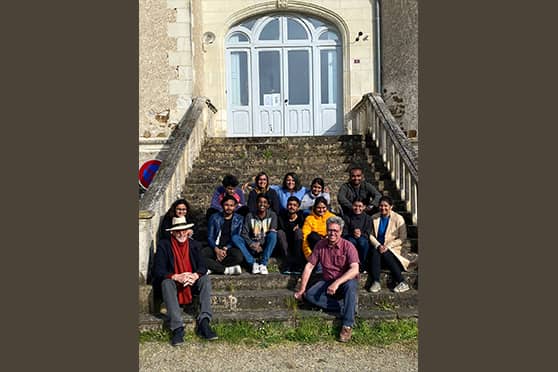The Design Village students’ work to be displayed at Boisbuchet's Chateau in France


Students from The Design Village (TDV) in Noida participated in the summer exhibition at Boisbuchet's chateau in France where they complemented the photos of ‘The Sacred Trees of India’ by renowned photographer Deidi Von Schaewen with their design, TDV said in a statement on April 28.
The students’ work during this summer exhibition will be featured at the chateau from June to September.
Students used the central areas of the gallery space to display useful objects which possess natural materials, shape, history and colour that liken them to the sacredness of the trees. Fusing materials from Boisbuchet’s nature with traditional materials of India, the team installed two prominent installations in five days. They installed the ‘Charpai and Jhoola Samuh: The Collective’ which is associated with trees in India.
Under the mentorship of Sneha Ravishankar and Pritesh Maru, TDV students Aritra Maitra, Arpita Saraswat, Ayushman Das, Dhanush Petluri, Dhimant Badan, Gunjana Kharband, Nitya Mital, Sparshika Upmanyu, Zaha Gupta and Zoya Gupta worked on the exhibition.
Speaking about their installations, Ravishankar said, "Our perspectives about sacredness varied but our emotions around trees remained the same. We brought India to Boisbuchet and travelled back home with a part of Boisbuchet in our hearts."
Professionals and students visit Boisbuchet every year to experience how internationally successful professionals structure their work and how they approach design problems.
Using wood from the forests of Boisbuchet, the students created the Charpai installation covered with strands of prayer threads and fabrics. The tree trunk at the centre of the installation represents the trees of India. Circular barks hung around the installation represent the prayer bells strung on trees in India. The circular rings found on the cross-section of tree trunks that tell the age of the tree are represented by the colourful circular pillow filled with dried grass from the fields of Boisbuchet.
The Jhoola installations complement Schaewen’s photographs. The base of the installation is made using wood from the forests of Boisbuche. Cotton threads that represent threads tied around tree trunks in India for wishes and prayers have been added to the Jhoola. The colourful hanging tassels represent repetitive, meditative practices and unity and they rebut monotony. Animal figurines made of terracotta are kept under the tree as a symbol of aspiration, fulfillment and prosperity of villagers. Lively and intricate patterns of the Rangoli add bright colours that attract positive energy. The use of cotton fabric through the applique technique added a modern twist to the installation.